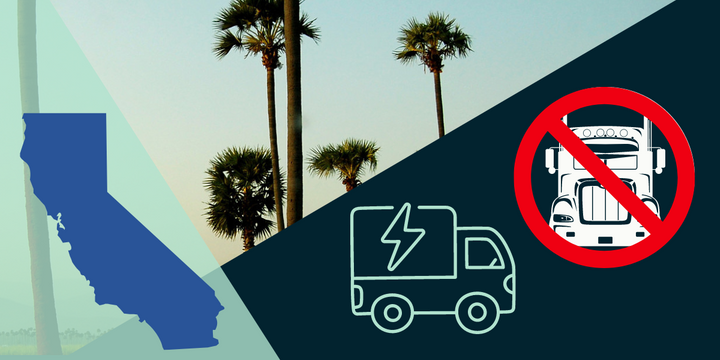Trucker Access › Forums › Diesel News › California’s Clean Air Act Exemption Targeted in Lawsuits Challenging Truck GHG Rules – Fleet Management
- This topic has 0 replies, 1 voice, and was last updated 11 months, 1 week ago by
 EazyRiDer66.
EazyRiDer66.
-
AuthorPosts
-
May 15, 2024 at 8:45 am #20569
 EazyRiDer66Keymaster
EazyRiDer66Keymaster

Lawsuits continue to target California’s GHG emissions rules for commercial trucks.
Does California have the legal authority to enact more stringent greenhouse gas emissions regulations than the federal government? A recent ruling by an appeals court quashed one legal challenge, but it’s just one of several lawsuits targeting the state’s Advanced Clean Fleets and Advanced Clean Trucks rules.
On April 9, the U.S. Court of Appeals for the D.C. Circuit ruled in Ohio v. EPA that the plaintiffs lacked standing to make some of their claims.
The suit charged that the EPA was not authorized to grant California the waiver under the Clean Air Act. It was brought by the attorneys general of Ohio and other states, and from oil, gas, and ethanol interests.
The unanimous decision by a three-judge panel found that both state petitioners and fuel petitioners lacked standing to raise some of their claims because they had not demonstrated how a favorable decision by the court would remedy their alleged injuries.
The fuel petitioners argue that the EPA exceeded its statutory authority under the Clean Air Act. State petitioners contended that the EPA’s waiver reinstatement decision was contrary to law because the relevant California regulations are preempted by a separate federal statute, the Energy Policy and Conservation Act of 1975.
“Both groups of petitioners fall far short of meeting their burden of demonstrating a ‘substantial probability that their alleged injuries would be redressed by a favorable decision by this court,” the judges said in their decision.
While 17 states were involved in challenging the California regulations, 23 states and cities argued the other side, as did did environmental and health groups and a coalition of automakers and energy companies.
More Challenges to California’s ‘Clean Truck’ Rules Still in Court System
The Advanced Clean Fleets rule is also under fire from the California Trucking Association, which filed suit in October, and the Western States Trucking Association’s two suits against the ACF and CARB’s Advanced Clean Trucks rule.
“Contrary to recent reports in the media, the D.C. Circuit did not decide that California may set its own emission standards for mobile sources,” said the Western States Trucking Association’s attorneys in a statement sent to WSTA members and media.
WSTA’s attorneys filed an amicus brief with the D.C. Circuit in Ohio v. EPA on behalf of the association supporting the petitioners, but its legal team contends that its standing arguments in its lawsuit, WSTA v. EPA, are much stronger than the ones used by the Ohio v. EPA petitioners.
“Ohio v. EPA does not detract from our main arguments in WSTA v. EPA regarding California’s Clean Trucks Rule because the court did not directly address those arguments, due to the fact that the Ohio v. EPA petitioners were kicked out on standing.”
New Challenge to Advanced Clean Fleets Rule from New Competitor to U.S. Chamber of Commerce
Meanwhile, a new lawsuit was filed April 1 in the U.S. District Court of the Eastern District of California by the American Free Enterprise Chamber of Commerce and the Associated Equipment Distributors, challenging California’s Advanced Clean Fleets rules. The lawsuit seeks declaratory and injunctive relief.
Formed in 2022, the American Free Enterprise Chamber of Commerce (AmFree) is a 501(c)(6) membership organization that represents entrepreneurs and businesses.
Associated Equipment Distributors (AED) is an international trade association representing companies that sell, rent, service, and manufacture equipment used in construction, agriculture, mining, forestry, power generation, and industrial applications.
Citing the “profound socioeconomic consequences” trucks have for the country, the suit says, “to gin up demand for electric trucks, CARB will simply eliminate choice for disfavored fleets: buy electric, or else.”
“California’s plan to destroy choice will ripple across the U.S. economy and wreak havoc on interstate commerce, all without Congress ever lifting a finger and, indeed, in defiance of federal law,” they claim.
The suit contends that the California Air Resource’s Boards action fall outside of the EPA’s narrow exception in the Clean Air Act allowing California to receive a waiver of EPA’s federal pre-emption of emissions standards. According to the Clean Air Act, the filing says “no such waiver shall be granted” if EPA finds that:
- California’s rules are “arbitrary and capricious:”
- The state doesn’t need the standards “to meet compelling and extraordinary conditions;” or
- California’s standards and enforcement procedures are not consistent with a part of the Clean Air Act that requires enough lead time “to permit the development and application of the requisite technology, giving appropriate consideration to the cost of compliance within such period.”
The suit contends that the terrible air pollution and smog problems California faced when the Clean Air Act was written, resulting in the exemption for the state to set its own emissions rules, are no longer the problem, and that the switch to focusing on climate change is not what the Clean Air Act authors had in mind.
“Trucks are now so clean that, according to CARB, 260 trucks are cleaner than a single train carrying the same cargo,” the suit notes.
AmFree is an organization that aims to be an alternative to the U.S. Chamber of Commerce. Bill Barr, who was attorney general in President Donald Trump’s administration, is the chairman of an advisory board for an AmFree project called the Center for Legal Action.
The Center for Legal Action is “dedicated to checking the insatiable expansion of the administrative state and returning power to the people and their elected representatives,” according to a news release announcing its formation.
Updated 4/11/2024 to clarify the appeals court decision and add information from the Western Trucking Association.
-
AuthorPosts
- You must be logged in to reply to this topic.